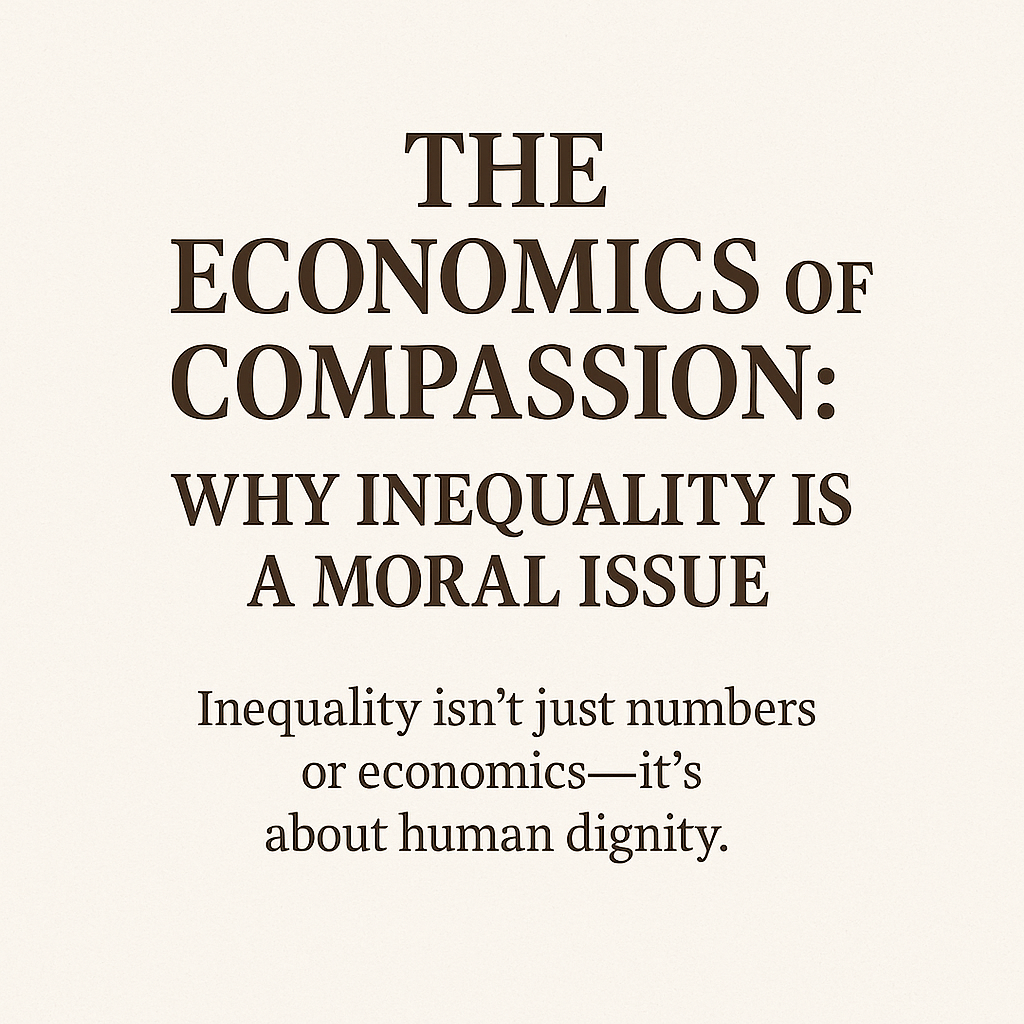Inequality isn’t just numbers or economics—it’s about human dignity.
When we talk about inequality, it’s easy to slip into statistics—percentiles of income, ratios of wealth, graphs of distribution. But behind those numbers are lives. Inequality is not just an economic condition; it is a moral crisis. It affects who gets to thrive, who gets to survive, and who is left behind altogether.
At The Church of Tinkerbell (TCOT), our core ethics—love, acceptance, and fairness—call us to look at inequality not as an abstract policy debate, but as a matter of compassion. Economics, like morality, is about choices. And when wealth and power are distributed unjustly, human dignity is diminished.
The Moral Harm of Vast Wealth Gaps
The gap between the wealthy few and the struggling many does more than skew balance sheets. It widens the distance between human beings, dividing society into those who have access to essential needs and those who don’t.
- Healthcare: In wealthy nations, it should be unthinkable that someone dies because they couldn’t afford treatment. And yet, this is reality. Illness becomes not just a physical battle but a punishment for poverty.
- Education: Children born into wealthy families are offered opportunity after opportunity, while others are forced to accept overcrowded classrooms, underfunded schools, and mounting debt for the chance at a better life.
- Housing: The fact that entire buildings sit vacant while families sleep in cars or shelters is not an economic inevitability—it is a moral failure.
When we allow wealth to concentrate so heavily at the top, we are essentially saying that the comfort of the few is more important than the survival of the many.
Inequality Feeds Shame, Exclusion, and Hopelessness
Economists often discuss inequality in terms of efficiency, growth, or productivity. But for those living it, inequality seeps into the soul. It fosters shame in those who cannot “measure up” to society’s standards of success. It fuels exclusion, separating communities into those who are “worthy” and those who are “burdens.” And it breeds hopelessness, the sense that no matter how hard someone works, they can never escape the cycle.
This isn’t just about money. It’s about the psychological harm of living in a culture that equates human worth with wealth, where those who struggle are blamed for systemic failures. The deeper the inequality, the deeper the wound to human dignity.
Corporate Greed and Political Oppression
Inequality is not an accident. It is designed and maintained by systems that prioritize profit over people. Corporations push wages down while funneling record profits to shareholders. Lobbyists ensure that tax loopholes remain wide enough for billionaires to pass through untouched. Political leaders, bound by moneyed interests, defend the powerful while ignoring the powerless.
This entanglement of greed and governance doesn’t just warp the economy—it warps democracy itself. When wealth buys influence, compassion has no seat at the table. The result is oppression disguised as policy, inequality disguised as “the market.”
Compassionate Economics: Valuing People Over Profit
A compassionate economy starts with a simple principle: people matter more than profit. This doesn’t mean profit is evil; it means profit cannot be the ultimate measure of value.
Compassionate economics asks:
- How are workers treated?
- Do families have secure housing?
- Is healthcare a right or a privilege?
- Are communities thriving, or are they being drained for someone else’s gain?
Love, acceptance, and fairness are not soft ideals; they are guiding principles for building systems where everyone’s dignity is protected. An economy rooted in compassion ensures that no one is discarded, no one is expendable, and no one is left behind.
Real-World Examples
- Housing Insecurity: In many cities, luxury condominiums sit empty, owned as investments by the wealthy, while thousands sleep without shelter. This isn’t a shortage of resources—it’s a shortage of compassion. Housing should be a human right, not a speculative commodity.
- Worker Exploitation: In the retail and service industries, wages are kept deliberately low while expectations are kept impossibly high. I know this firsthand. In my own experience in retail, I’ve seen workers burned out, belittled, and discarded when they could no longer keep pace. These industries depend on human beings—yet often treat them as disposable tools. The toll is not just financial but emotional, leaving workers drained of dignity.
Closing: Inequality Is Not Inevitable
Inequality is often presented as the natural outcome of competition, ambition, or “how the world works.” But that narrative serves only those who benefit from the imbalance. Inequality is not inevitable; it is the result of choices—choices to hoard instead of share, to exploit instead of uplift, to prioritize profits over people.
The truth is simple: inequality is a failure of compassion.
We can envision a different system, one rooted in dignity for all. Imagine a world where housing is secure, healthcare is guaranteed, education is a pathway instead of a privilege, and workers are treated as human beings instead of costs on a spreadsheet. That vision is not utopian—it is possible when love, acceptance, and fairness are woven into the fabric of our economy.
Compassion is not a weakness; it is our greatest strength. And until we build an economy that reflects that, we will continue to sacrifice human dignity at the altar of greed.


